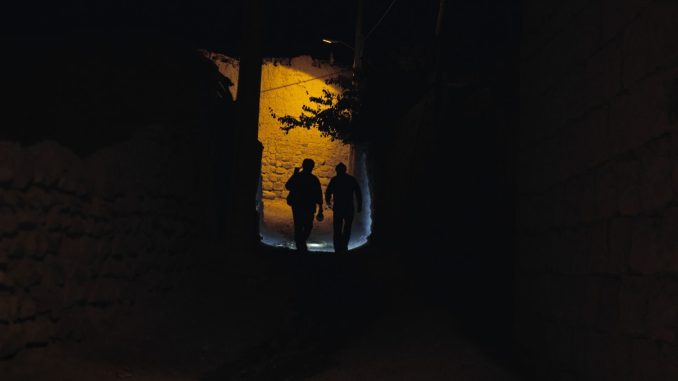No Bears Confronts the Dystopian Construct of Borders

The rigidity of borders—literal and figurative—is the primary interest of No Bears, Iranian filmmaker Jafar Panahi’s latest film. Completed two months before the director’s most recent arrest—culminating in a six-year prison sentence for “propaganda against the regime” in his native Iran—the film is a meta-commentary on the artistic suppression that Panahi has been increasingly subjected to throughout his career, also currently affecting a large swath of Iranian filmmakers, artists and activists.
No Bears incorporates two parallel plot lines. The first involves Panahi (who plays himself) covertly renting a room near the Iranian border, secretly overseeing the shoot for his next film, which is happening in a nearby Turkish city. Restricted from leaving Iran (much like the real-life Panahi), he monitors the production’s progress via Zoom and cell phone calls—that is, when the frequently-spotty reception allows for it. In his free time, he takes photographs of the small town he’s lodging in, with special emphasis on its provincial residents. However, he quickly becomes embroiled in a local scandal involving a photo he allegedly took of a young couple whose union is strictly forbidden by the town’s traditional customs, though he vehemently swears that no such photograph exists. The second storyline occurs within Panahi’s intra-film narrative, which similarly concerns a star-crossed couple. Bakhtiar (Bakhtiar Panjei) and Zara (Mina Khosravani) struggle to obtain an extra passport so that they can flee to Europe together, a plot that stems from the actors’ (at least as they appear in No Bears) own lived experiences. Soon, the prospect of illegally leaving the country becomes a pressing concern for all parties, both real and fictional, involved.
After receiving a 20-year ban on filmmaking by the state in 2010, Panahi has resorted to illegally crafting his films. He’s appeared as himself in each project he’s discreetly developed ever since, beginning with his 2011 documentary This Is Not a Film. No Bears is no different, though it does follow the scripted dramatic leanings of his most recent effort 3 Faces (2018) as opposed to the docu-fiction hybrid of Closed Curtain (2015) and Taxi (2017). While 3 Faces explores the social position of women in Iran through oft-whimsical encounters as Panahi drives across northwestern Iran with actress Behnaz Jafari (also playing herself), No Bears feels much more darkly prophetic, seemingly aware of the filmmaker’s encroaching imprisonment. The authorities are an omnipresent threat to Panahi’s character in the film, suspicious that he’s traveled from his home in metropolitan Tehran to a small village conveniently close to the border.
-

-

-

-

-

-

-

-

-

-

-

-

-

-

-

-

-

-

-

-

-

-

-

-

-

-

-

-

-

-

-

-

-

-

-

-

-

-

-

-








































